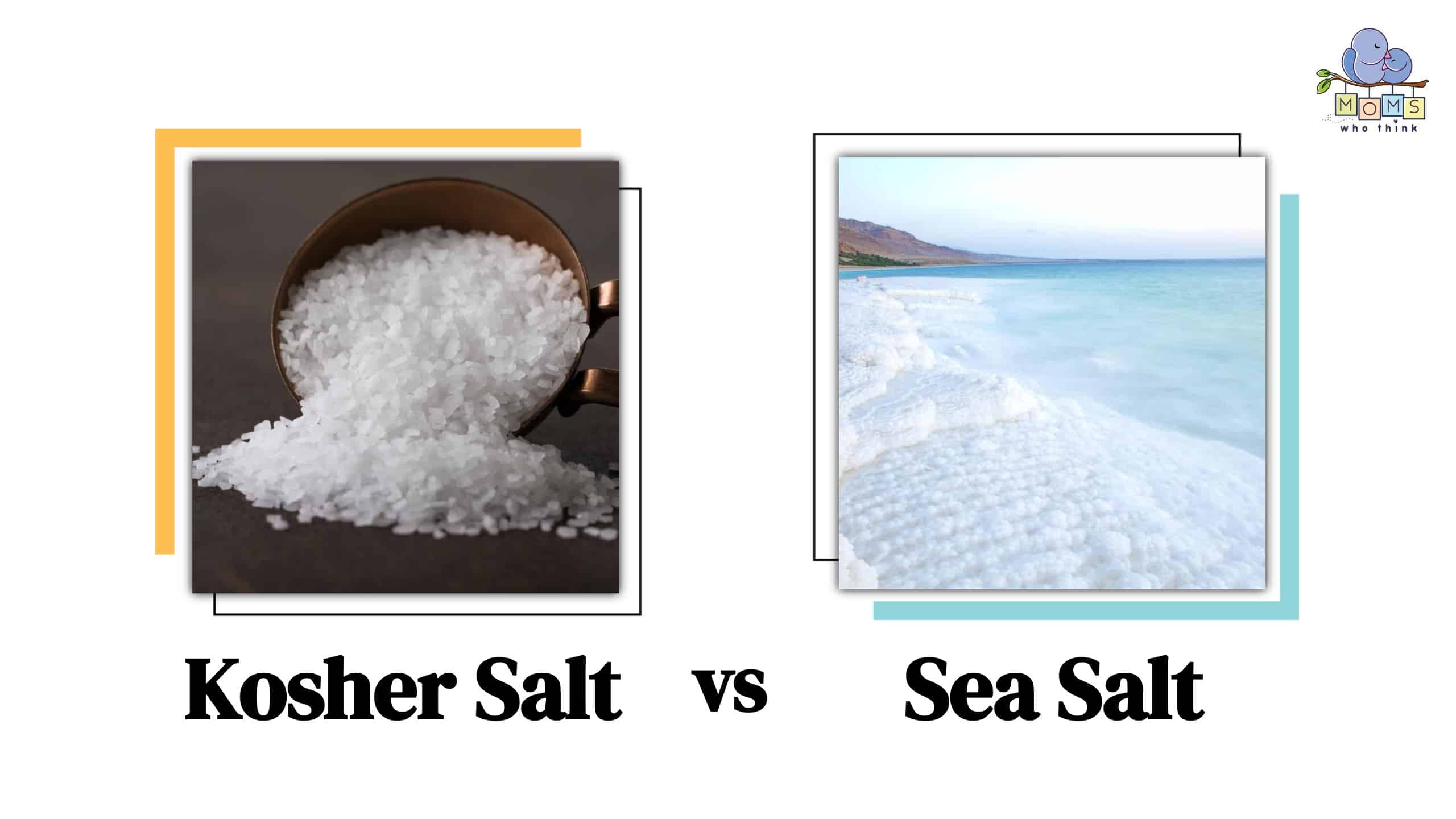What is the difference between kosher salt and sea salt? The main difference is the source behind each salt. Kosher salt mining happens underground. On the other hand, sea salt is from the ocean water. The seawater undergoes evaporating, leaving behind sodium chloride.
Salt is an everyday staple across homes worldwide. The salt each person uses comes down to personal preference. Although minimal health differences exist between each type of salt, a few differences set each one apart.
When it comes to sea salt and kosher salt, there are a couple of similarities. First, both are sodium chloride and undergo minimal processing. Kosher salt is not typically iodized. Iodizing is adding in iodine, a vital mineral that is beneficial to thyroid health. Sea salt also is not iodized, unlike its close cousin, table salt.
Benefits of Salt
Salt is sodium chloride, which offers many benefits for daily living. Foremost, our bodies use sodium chloride to absorb certain nutrients. Some of these nutrients include amino acids, sugar, and water.
Sodium chloride is also beneficial for staying hydrated and maintaining your blood pressure. How this works is very interesting. Our body sends chemical signals to our kidneys. These signals tell our body when to hold on to water or when to get rid of it. How much sodium we have in our system can help with the rise and fall of our blood pressure by controlling the water released into our bloodstream.
Salt is also in everyday household items like bath salts and scrubs to help with skin irritation. Salt has many more uses that are beneficial.
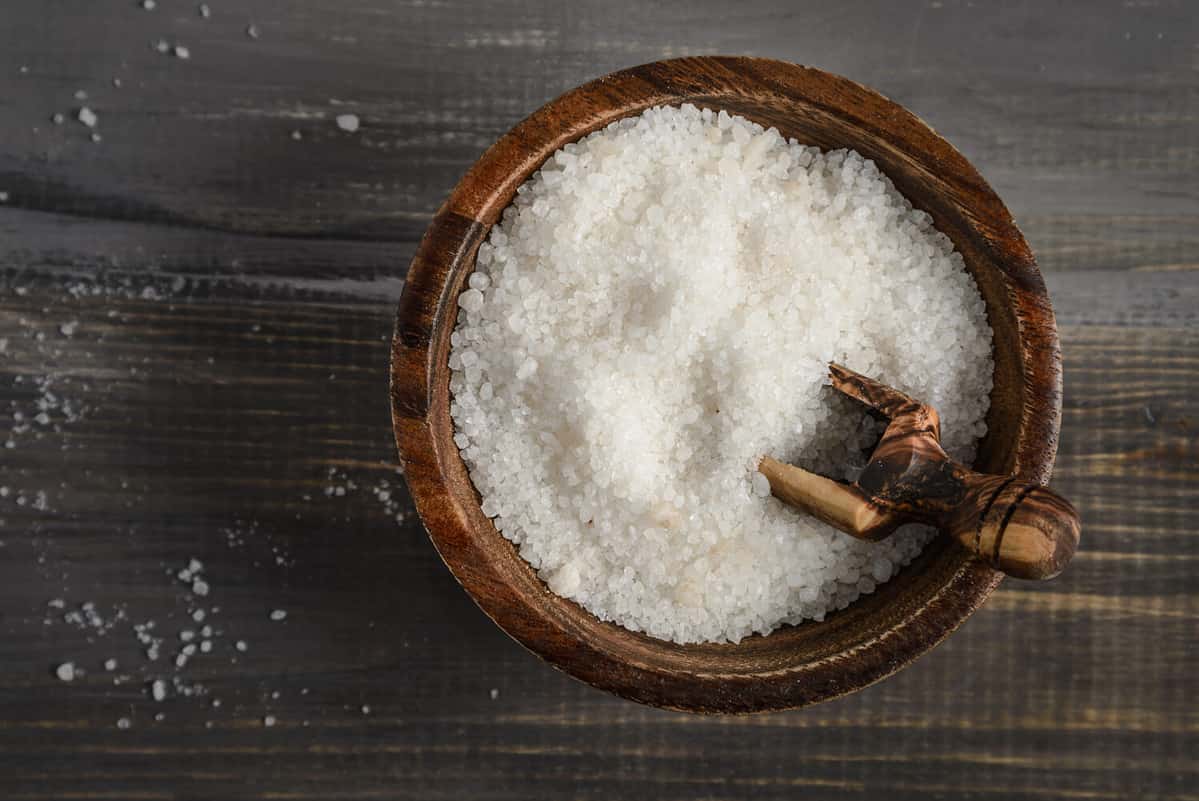
©Albina Bugarcheva/Shutterstock.com
Kosher Salt vs. Sea Salt: What are the Differences?
When one thinks about salt, images of the fine, white table salt typically pop into mind. It can be confusing to know the difference between each type of salt. However, the subtle differences are what set each one apart.
A few main differences between kosher and sea salt set the two apart. Kosher salt mining happens underground. Even though it undergoes a processing method, it has no additive minerals, including iodine, unlike table salt. This leaves it in a purer form.
Sea salt, on the other hand, is salt that is evaporated from seawater. Sea salt also undergoes minimal processing. This leaves minerals, including iron and calcium.
Kosher salt is often used while cooking. The large grains make it easy to grab and sprinkle over the dish.
Another difference is in the composition of sea salt and kosher salt. Kosher salt is purely sodium chloride with no additives or iodine added to it. Sea salt is also sodium chloride. However, it contains a small amount of minerals, including iron.
When it comes to the texture and appearance of both of these salt, they also differ a bit. Kosher salt is purely white and has large flakes that are coarse. Sea salt is coarser than table salt, but the main difference is the uneven flakes. Sea salt is white; however, it can sometimes be pink or gray.
Is There a Difference in Flavor?
Sea salt undergoes less processing than table salt. The minerals left behind mean sea salt has a more distinct and strong flavor. The additional assertive flavor and the crunchy texture mean it's easier to identify sea salt.
Kosher salt also has a different flavor than typical table salt. This is because no additives are in kosher salt, including iodine. This means kosher salt has a purer flavor. It does not leave the typical bitter aftertaste either.
Kosher Salt vs. Sea Salt Nutritional Value
Kosher salt is purely sodium chloride. It does not have trace minerals like sea salt, added iodine, or anti-clumping agents. Sea salt has trace minerals like potassium, magnesium, calcium, and iron. While it is common for many to assume that trace minerals make one healthier than the other, the truth is that minerals add very little value. This means that the nutritional value for every type of salt stays mostly the same across the board. Therefore, the salt you use comes down to personal preference. Let's look at the nutritional value chart between kosher and sea salt for a closer look at the differences.
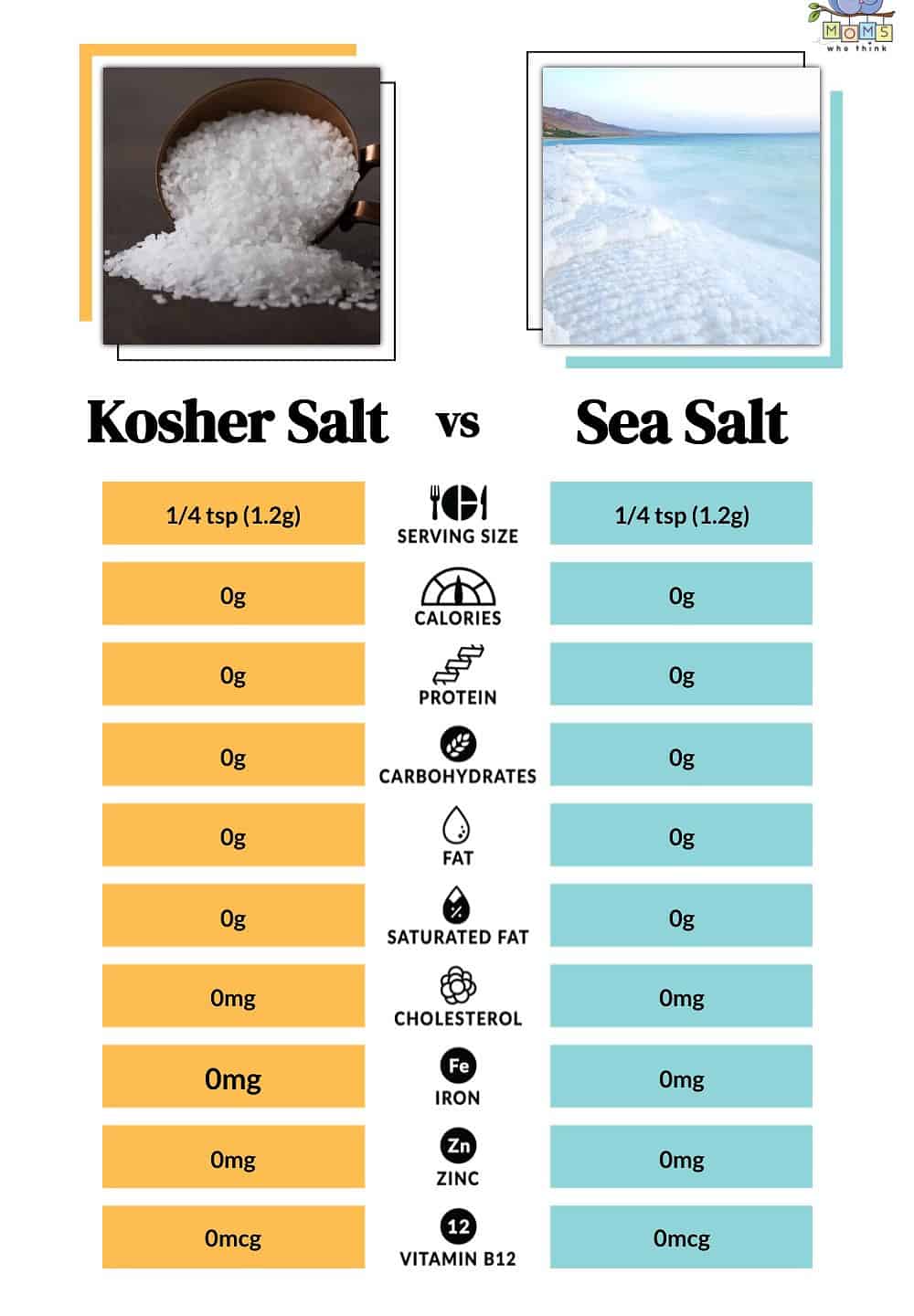
©
What is Kosher Salt?
Kosher salt is a type of salt that is mined underground. No additives are put into the salt, not even iodine, during the processing. This leaves it purely sodium chloride.
Kosher salt is a large flake that has a courser texture. The flakes are big, meaning it is easier to sprinkle over dishes.
When one hears the name kosher, it's likely to assume the salt is kosher. However, this isn't always the case. Being kosher-certified is different than simple kosher salt. This type of salt has been saddled with this name because it is often used in the koshering method. The blood is drained from meat, and kosher salt is helpful during this process.
Kosher salt is a large, white, textured salt grain used to season foods and preserve meats.
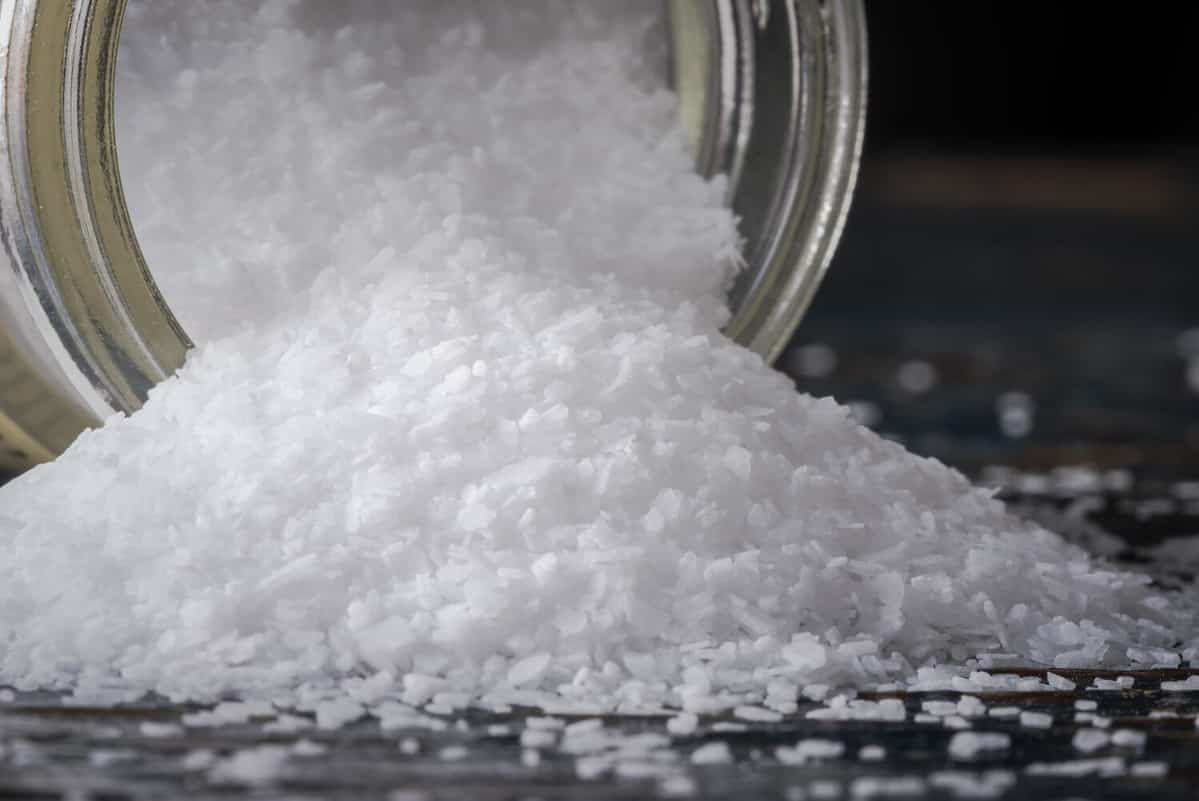
©Michelle Lee Photography/Shutterstock.com
What is Sea Salt?
Sea salt is salt that has been evaporated from ocean water. This type of salt does not undergo extensive processing. The lack of extensive processing means that trace minerals are left behind. These include potassium, calcium, and iron. However, it is important to remember that these minerals are very low; you would have to consume a dangerous amount of salt to receive the full benefit of these minerals daily.
Sea salt is great as a flavor booster in many dishes. It has a stronger and more biting flavor than many other salts. It can be pink, gray, or white and has an uneven and coarse texture.
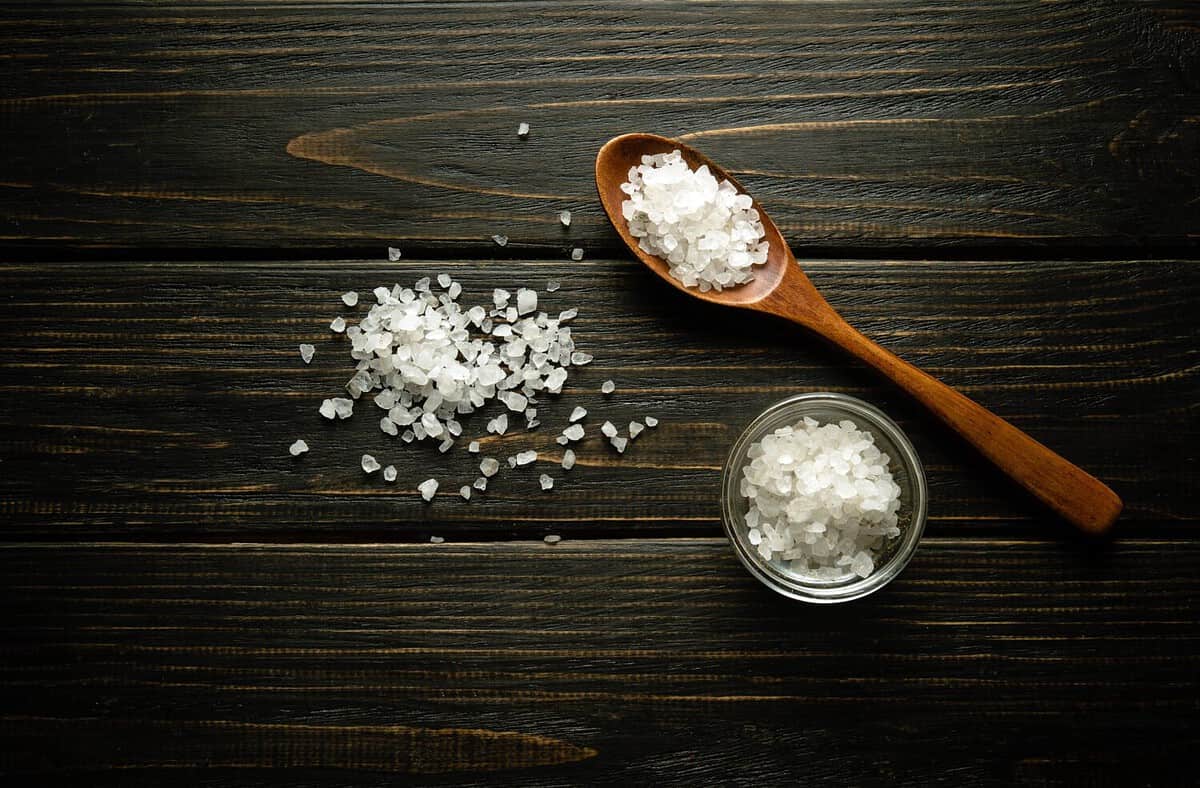
©VITALII BORKOVSKYI/Shutterstock.com
Can You Substitute Kosher Salt for Sea Salt?
The type you use honestly depends on personal preference when it comes to salt. The differences will be in texture, flavor, and appearance. Many misconceptions say that one salt offers more nutritional value than the other. However, the evidence to support these claims simply isn't there. So, when it comes to the salt you use, the health benefits carry little weight. Therefore, it is possible to substitute kosher salt and sea salt for one another.
The flavor and texture may vary slightly. Yet, if you are sprinkling salt over food, chances are the salt will melt into the dish in a way that the differences will be very subtle.
One Last Note
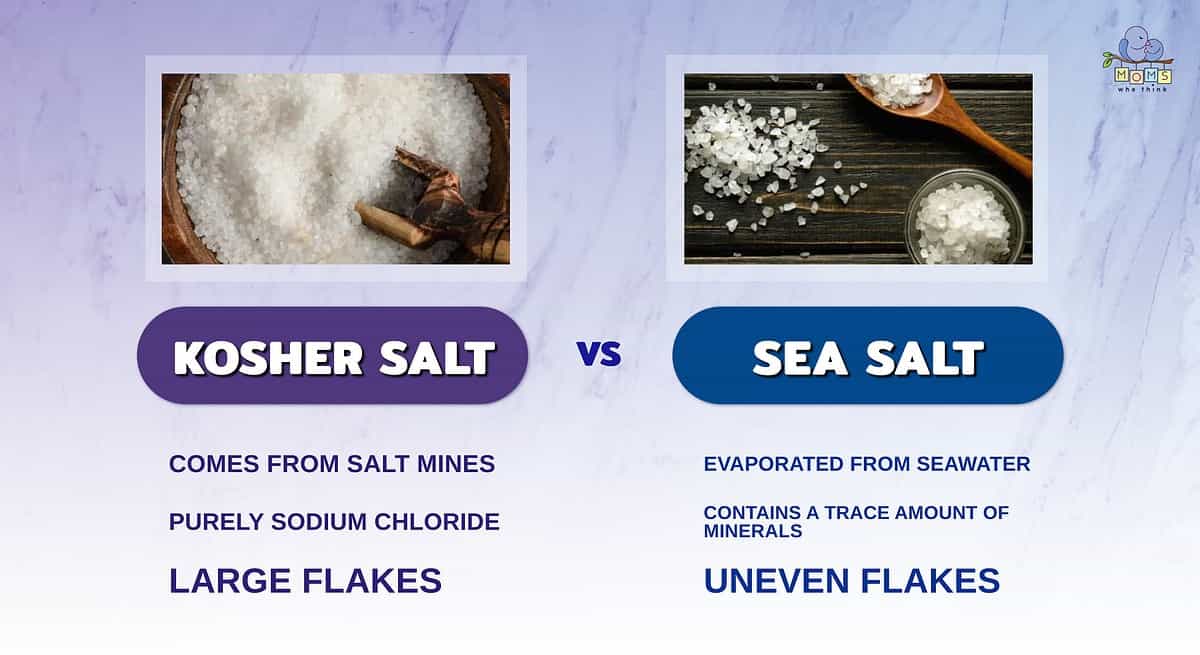
- Kosher salt is mined from underground salt mines, while sea salt is extracted from seawater.
- Sea salt has a trace amount of minerals, such as iron, while Kosher salt is purely sodium chloride.
- Kosher salt's large flakes make it easy to work with. Sea salt can have large flakes, but the size and texture of its flakes tends to be less uniform than Kosher salt's.
Salt is an important mineral that is necessary for daily life. Sodium chloride can offer many benefits, including balancing digestion, clearing skin conditions, and stabilizing blood pressure.
It is important to remember that too much or too little sodium chloride can adversely affect our health. Too much sodium can affect heart health or high blood pressure. Low salt intake can lead to dehydration or low blood pressure. Therefore, it is vital to balance your salt intake to ensure you are getting the right amount.
When it comes to the differences between kosher salt and sea salt, the differences are subtle yet still there. Kosher salt and sea salt have differences in sources. One comes from underground, the other from the sea. More differences include the colors, texture, and even flavor. Which one you use will be dependent upon your personal preference! Either way, both salts are great additions to hearty dishes and have tremendous benefits around the house.
This French Toast Casserole recipe uses kosher salt:
Print
French Toast Casserole
- Yield: Serves 8 to 10 1x
Ingredients
- 1 1/2 loaves french bread (1 pound each)
- 2–3 tablespoons butter (for sides of the dish)
- 8 ounces cream cheese, room temperature
- 1 1/2 cups sugar, divided
- 2 tablespoons fresh orange juice
- 9 large eggs, divided
- cranberry syrup (recipe follows) or tart berry jam, or tart pie filling
- 1 cup heavy cream
- 1 1/2 cup milk
- 1 1/2 tablespoons vanilla extract
- 1 1/2 tablespoons orange flavoring
- 1/4 teaspoon kosher salt (less if table salt)
- 2 tablespoons grated orange rind
- Cranberry Syrup:
- 1 cup water
- 1/2 cup sugar
- 1 1/2 tablespoons cornstarch
- 1 teaspoon fresh lemon juice
- 2 cups (almost 10 ounces) fresh or frozen cranberries
Instructions
- Slice the crust from the bottom and sides of the bread leaving the soft top crust. Cut the bread into 1 inch cubes. Place 2/3 of the cubes in a buttered 9 by 13 inch dish.
- Beat the cream cheese, 1/4 cup of the sugar, 2 tablespoons orange juice and 1 of the eggs together on medium speed until blended. Pour over the bread cubes in the dish.
- Spoon dabs of cranberries from the cranberry syrup randomly on top of the cream cheese mixture making sure every piece will have some of the cranberries.
- Cover with the remaining cubes of bread.
- In a large bowl, mix the heavy cream, milk, 1/2 cup of the remaining sugar, vanilla, orange flavoring, salt and the remaining 8 eggs together on medium speed. Pour evenly over the bread making sure to spoon some of the mixture over the drier parts.
- Cover tightly and place in the refrigerator for at least one hour or overnight.
- Mix the last 3/4 cups sugar with the orange zest and place in the refrigerator until needed.
- When ready to bake, remove the french toast casserole from the refrigerator.
- Preheat the oven to 350 degrees F.
- Unwrap the dish and sprinkle the sugar and zest mixture evenly across the top.
- Bake for 50 to 60 minutes or until a toothpick inserted into the middle comes out clean. This will be a very soft, bread pudding type dish.
- Serve with warm Cranberry Syrup, maple syrup or any other berries used in the recipe.
- Directions for Cranberry Syrup:
- In a small sauce pan, whisk the water, sugar, cornstarch and lemon juice together until well blended and there are no lumps in the cornstarch. Add the cranberries and place over medium heat. Bring the mixture to a boil and remove from the heat as soon as the cranberries begin to burst. Pour into a heat proof dish to cool and thicken.
Comparison and Salt Posts
- Granulated Garlic vs. Garlic Powder: Texture Differences, Flavor Tips, And Recipes
- White Pepper vs. Black Pepper: Health Benefits and Uses
- Uses for Epsom Salt You Never Knew
- Kosher Salt vs. Coarse Sea Salt: A Taste Test
- How to Use Sea Salt vs. Rock Salt in Foods
